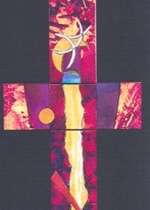By Fr Allen Morris
From the earliest years of Christianity Sunday has been celebrated as the feast of the Resurrection. In the celebration of Sunday Mass we are privileged to be present at the memorial of the Last Supper, the re-presentation of the Sacrifice of Calvary, and to greet our risen Lord present to us in form of bread and wine. The Paschal Mystery, the Easter Mystery, is celebrated and we share again in the salvation it won for us.
From the earliest times, wherever Christians were, this was our weekly feast. However, early on, and perhaps as early as Sunday was kept, there was kept also an annual feast of Pascha (our Easter). This feast was kept on or close to the Jewish feast of Passover, because of the tradition, preserved in Scripture that the Last Supper and the Crucifixion of Jesus took place on or close to that Jewish feast.
Sunday has remained Sunday, but Easter has expanded well beyond what the first Christians would have been familiar with. This expansion seems to have begun in Jerusalem, and dates from at least the 4th Century when sites associated with the Passion, Death and Resurrection were claimed by the first Christian Emperor, Constantine, and became more available for public Christian worship. We have the travel diary of a religious sister called Egeria who visited the Holy Land in the 380s and this bears witness to a highly developed series of commemorative vigils and services held in appropriate places and at the appropriate times during Holy Week as the people gathered and processed in a spiritual accompaniment of the Lord. This was something new in the history of the Church, and it proved very popular.
Pilgrims returning home carried with them accounts of how the Liturgy of Holy Week/Easter was celebrated in Jerusalem, and very quickly the pattern of the celebration of Easter Sunday, in the context of a Holy Triduum was adopted by the Church East and West.
The Tradition
The Triduum (Three Days) begins with the evening Mass on Maundy Thursday (Thursday of the Lord’s Supper); continues through Good Friday and comes to its glorious climax with Easter Day, beginning with the principal service of the Church’s Liturgical year, the Easter Vigil.
The Triduum begins with the evening Mass of the Lord’s Supper, and continues with the watching at the Altar of Repose (remembering the Last Supper and the Agony in the garden).
Good Friday has its Solemn Liturgy of the Passion, but in many parishes this will be complemented by gatherings beforehand for the Stations of the Cross, and after in silent vigil before the Cross – with these services often celebrated ecumenically, together with other Christian communities.
Holy Saturday is a day empty of such great services, but there may be gatherings with those preparing for Baptism for final rites of preparation, and as on all these days the Church maintains the rhythm of the celebration of the Liturgy of the Hours. Then in the night fires are lit and the keeping of the Great Vigil begins, concluding with the celebration of the Eucharist, the first Mass of Easter.
The Church urges that the liturgies of these days be prepared and celebrated with the care that befits their importance. And there are a lot of different liturgies and times of prayer. And a lot of song! This gets a special emphasis in the new edition of the Roman Missal where it is noted that ‘The singing of the people, the ministers and the Priest Celebrant has a special importance in the celebrations of these days, for when texts are sung, they have their proper impact.’ So it is good to know that during Lent many clergy and others have been coming together to familiarise themselves with the new chant provided for the songs of the Triduum in the new edition of the Missal.
But there is more to these days than these liturgies and other times of prayer. On Thursday night we are encouraged to present our gifts for the poor along with the bread and wine to be offered in the Eucharist. The Liturgy is offered not only in thanksgiving to God, but to effect change in us. As we sing that night: ‘Where true charity is dwelling, God is present there’. Following the celebrations of that night the Paschal Fast begins. It is celebrated everywhere on Good Friday and, where appropriate, prolonged also through Holy Saturday as a way of bringing us, with spirit uplifted, to the joys of the Lord’s Resurrection.
Days to transform us
Again, these are days and events to transform us, so that we ourselves might become agents of change, witnesses to and ministers of the gospel. Famously St Augustine said to those made Christian at the Vigil, as they were about to receive Holy Communion for the first time: ‘You are the Body of Christ, become the Body of Christ.’
Gerard Manley Hopkins expressed something similar in the prayer which concludes his poem, ‘The Wreck of the Deutschland’, a profound meditation on human frailty and mortality, and on the salvation gifted us by the Risen Lord that will raise us too beyond the limits of humanity and death.
‘Let him easter in us, be a dayspring to the dimness of us, be a crimson-cresseted east,
More brightening her, rare-dear Britain, as his reign rolls,
Pride, rose, prince, hero of us,
high-priest,
Our hearts’ charity’s hearth’s fire, our thoughts’ chivalry’s throng’s Lord.'




